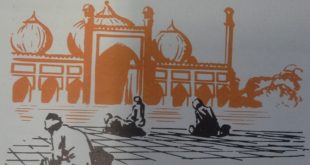Thirteen and a half centuries ago a new religion began in Arabia. Today millions of people are followers of this religion. It is called Islam and its followers, Moslems. All their lives long, Moslems must pray, in ways clearly prescribed, five times every day. No ordinary event must be allowed to interfere with these moments of prayer. Moslems must learn to recite their creed — a long statement of their religious belief. For one month each year they must fast all of every day from sunrise to sunset. They must give generously to charity. They should, if at all possible, …
Read More »Tag Archives: Mohammed
Fury from the North 814-1042
“. . FROM THE FURY OF THE NORTHMEN, Good Lord, deliver us.” Until recent times, this line was included in the prayer book used by the Church of England. The raids of the Norse Vikings on Britain were so terrible that the victims never forgot them. For generations the memory of the savage Norsemen was kept alive and Englishmen repeated this prayer for more than a thousand years. It was not only Britain that felt the fury of the Norsemen; they raided the European continent as well. The Norsemen’s ships themselves seemed to threaten terror. The hull of a Viking …
Read More »Cracks in the Wall of Islam A.D. 656-750
THE FIRST three caliphs — Abu Bakr, Omar and Othman — had all known — Mohammed well. In 656, Othman, an old man in his eighties, was stabbed to death by a band of rebels. They believed that the right to be caliph belonged to Mohammed’s son-in-law, Ali. Sometime later, Ali defeated his rivals for power in battle and proclaimed himself caliph. Instead of Medina, he chose as his capital the new Arab city of al-Kufah, in Iraq. All but one of the leaders of Islam swore loyalty to Ali. The exception was Muawiyah, the governor of Syria, who set …
Read More »The Holy Book of Allah A. D. 632-732
Mohammed sometimes dictated his thoughts to his secretary, Zayd, but when he spoke in public no one wrote down what he said. Instead, his listeners learned his speeches by heart and mistakes crept in, as they usually do. Only a short time after Mohammed’s death people were repeating his sayings in quite different ways. If Mohammed had been anyone else, this would not really have mattered. It would have been enough to remember what he had said without bothering too much about how he had said it. But the Moslems believed that God himself had addressed them through Mohammed. Every …
Read More »Mohammed, Prophet of Allah A. D. 571 – 632
IN THE year 571, in Mecca, a boy was born in a humble household of the Quraysh. No one knows what name he was given. His father died before his birth and his mother when he was six. The orphan, boy now called Mohammed, was brought up by his grandfather. When his grandfather also died, he came into the care of his uncle, Abu Talib. Nothing definite is known about his early life. As a boy, he may have tended sheep at the edge of the desert outside the city. When he was old enough to ride a camel, he …
Read More »Byzantine Glory A.D. 610-1057
The period from 610 to 717 was one of the darkest in Byzantine history. During that time, the edges of the empire crumbled under the pressure of powerful enemies. A people from northern Italy, the Lombards, conquered more than half of Italy. In central Arabia, the Arab tribes had joined together under the religion of Mohammed and marched against their neighbors. They took the kingdom of Persia, invaded Palestine and in 658 captured Jerusalem. The conquering Moslems, as the followers of Mohammed were called, swept on and soon took over Syria and Egypt. They marched along the northern shore of …
Read More »




